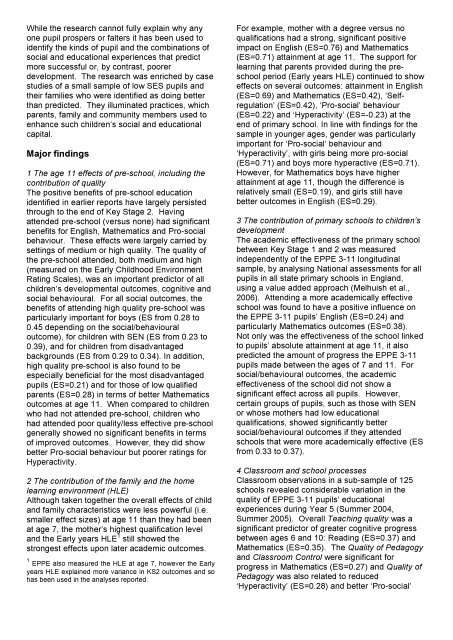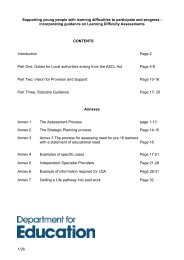Research Brief - Department for Education
Research Brief - Department for Education
Research Brief - Department for Education
Create successful ePaper yourself
Turn your PDF publications into a flip-book with our unique Google optimized e-Paper software.
While the research cannot fully explain why any<br />
one pupil prospers or falters it has been used to<br />
identify the kinds of pupil and the combinations of<br />
social and educational experiences that predict<br />
more successful or, by contrast, poorer<br />
development. The research was enriched by case<br />
studies of a small sample of low SES pupils and<br />
their families who were identified as doing better<br />
than predicted. They illuminated practices, which<br />
parents, family and community members used to<br />
enhance such children’s social and educational<br />
capital.<br />
Major findings<br />
1 The age 11 effects of pre-school, including the<br />
contribution of quality<br />
The positive benefits of pre-school education<br />
identified in earlier reports have largely persisted<br />
through to the end of Key Stage 2. Having<br />
attended pre-school (versus none) had significant<br />
benefits <strong>for</strong> English, Mathematics and Pro-social<br />
behaviour. These effects were largely carried by<br />
settings of medium or high quality. The quality of<br />
the pre-school attended, both medium and high<br />
(measured on the Early Childhood Environment<br />
Rating Scales), was an important predictor of all<br />
children’s developmental outcomes, cognitive and<br />
social behavioural. For all social outcomes, the<br />
benefits of attending high quality pre-school was<br />
particularly important <strong>for</strong> boys (ES from 0.28 to<br />
0.45 depending on the social/behavioural<br />
outcome), <strong>for</strong> children with SEN (ES from 0.23 to<br />
0.39), and <strong>for</strong> children from disadvantaged<br />
backgrounds (ES from 0.29 to 0.34). In addition,<br />
high quality pre-school is also found to be<br />
especially beneficial <strong>for</strong> the most disadvantaged<br />
pupils (ES=0.21) and <strong>for</strong> those of low qualified<br />
parents (ES=0.28) in terms of better Mathematics<br />
outcomes at age 11. When compared to children<br />
who had not attended pre-school, children who<br />
had attended poor quality/less effective pre-school<br />
generally showed no significant benefits in terms<br />
of improved outcomes. However, they did show<br />
better Pro-social behaviour but poorer ratings <strong>for</strong><br />
Hyperactivity.<br />
2 The contribution of the family and the home<br />
learning environment (HLE)<br />
Although taken together the overall effects of child<br />
and family characteristics were less powerful (i.e.<br />
smaller effect sizes) at age 11 than they had been<br />
at age 7, the mother’s highest qualification level<br />
and the Early years HLE 1 still showed the<br />
strongest effects upon later academic outcomes.<br />
1 EPPE also measured the HLE at age 7, however the Early<br />
years HLE explained more variance in KS2 outcomes and so<br />
has been used in the analyses reported.<br />
For example, mother with a degree versus no<br />
qualifications had a strong, significant positive<br />
impact on English (ES=0.76) and Mathematics<br />
(ES=0.71) attainment at age 11. The support <strong>for</strong><br />
learning that parents provided during the preschool<br />
period (Early years HLE) continued to show<br />
effects on several outcomes: attainment in English<br />
(ES=0.69) and Mathematics (ES=0.42), ‘Selfregulation’<br />
(ES=0.42), ‘Pro-social’ behaviour<br />
(ES=0.22) and ‘Hyperactivity’ (ES=-0.23) at the<br />
end of primary school. In line with findings <strong>for</strong> the<br />
sample in younger ages, gender was particularly<br />
important <strong>for</strong> ‘Pro-social’ behaviour and<br />
‘Hyperactivity’, with girls being more pro-social<br />
(ES=0.71) and boys more hyperactive (ES=0.71).<br />
However, <strong>for</strong> Mathematics boys have higher<br />
attainment at age 11, though the difference is<br />
relatively small (ES=0.19), and girls still have<br />
better outcomes in English (ES=0.29).<br />
3 The contribution of primary schools to children’s<br />
development<br />
The academic effectiveness of the primary school<br />
between Key Stage 1 and 2 was measured<br />
independently of the EPPE 3-11 longitudinal<br />
sample, by analysing National assessments <strong>for</strong> all<br />
pupils in all state primary schools in England,<br />
using a value added approach (Melhuish et al.,<br />
2006). Attending a more academically effective<br />
school was found to have a positive influence on<br />
the EPPE 3-11 pupils’ English (ES=0.24) and<br />
particularly Mathematics outcomes (ES=0.38).<br />
Not only was the effectiveness of the school linked<br />
to pupils’ absolute attainment at age 11, it also<br />
predicted the amount of progress the EPPE 3-11<br />
pupils made between the ages of 7 and 11. For<br />
social/behavioural outcomes, the academic<br />
effectiveness of the school did not show a<br />
significant effect across all pupils. However,<br />
certain groups of pupils, such as those with SEN<br />
or whose mothers had low educational<br />
qualifications, showed significantly better<br />
social/behavioural outcomes if they attended<br />
schools that were more academically effective (ES<br />
from 0.33 to 0.37).<br />
4 Classroom and school processes<br />
Classroom observations in a sub-sample of 125<br />
schools revealed considerable variation in the<br />
quality of EPPE 3-11 pupils’ educational<br />
experiences during Year 5 (Summer 2004,<br />
Summer 2005). Overall Teaching quality was a<br />
significant predictor of greater cognitive progress<br />
between ages 6 and 10: Reading (ES=0.37) and<br />
Mathematics (ES=0.35). The Quality of Pedagogy<br />
and Classroom Control were significant <strong>for</strong><br />
progress in Mathematics (ES=0.27) and Quality of<br />
Pedagogy was also related to reduced<br />
‘Hyperactivity’ (ES=0.28) and better ‘Pro-social’
















